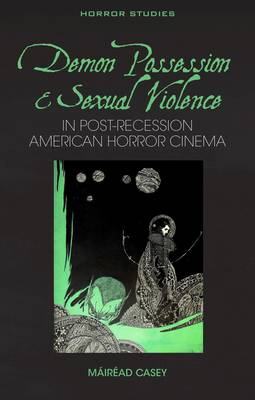
- Afhalen na 1 uur in een winkel met voorraad
- Gratis thuislevering in België vanaf € 30
- Ruim aanbod met 7 miljoen producten
- Afhalen na 1 uur in een winkel met voorraad
- Gratis thuislevering in België vanaf € 30
- Ruim aanbod met 7 miljoen producten
Zoeken
Demon Possession and Sexual Violence in Post-Recession American Horror Cinema
Máiréad Casey
€ 114,95
+ 229 punten
Omschrijving
Examines how cultural and economic anxieties in 2008 influenced the popularity of demon possession and gendered violence in American horror. This book examines American horror films as key sites for exploring contemporary anxieties around gender, power, and trauma. In this groundbreaking study, Máiréad Casey traces the resurgence of demon-possession narratives in US cinema following the 2008 financial crisis, a period marked by intensified misogyny, the rise of fourth-wave feminism, and shifting representations of sexual violence. Through incisive analysis of films such as Deliver Us from Evil (2014), The Neon Demon (2016), and The Scary of Sixty-First (2021), this study explores how the possessed body, particularly the possessed female body, emerges as a battleground for cultural fears about sexuality, violence, and agency. Demon Possession and Sexual Violence in Post-Recession American Horror Cinema demonstrates how demon-possession films reflect, reproduce, and sometimes challenge dominant narratives about sexual violence and victimhood. Reframing possession as more than merely a horror trope, this book offers a vital lens for understanding gender and sexual politics in an age of economic precarity and social reckoning.
Specificaties
Betrokkenen
- Auteur(s):
- Uitgeverij:
Inhoud
- Aantal bladzijden:
- 272
- Taal:
- Engels
- Reeks:
Eigenschappen
- Productcode (EAN):
- 9781837723577
- Verschijningsdatum:
- 20/05/2026
- Uitvoering:
- Hardcover
- Formaat:
- Genaaid
- Afmetingen:
- 138 mm x 216 mm
- Gewicht:
- 453 g

Alleen bij Standaard Boekhandel
+ 229 punten op je klantenkaart van Standaard Boekhandel
Beoordelingen
We publiceren alleen reviews die voldoen aan de voorwaarden voor reviews. Bekijk onze voorwaarden voor reviews.








